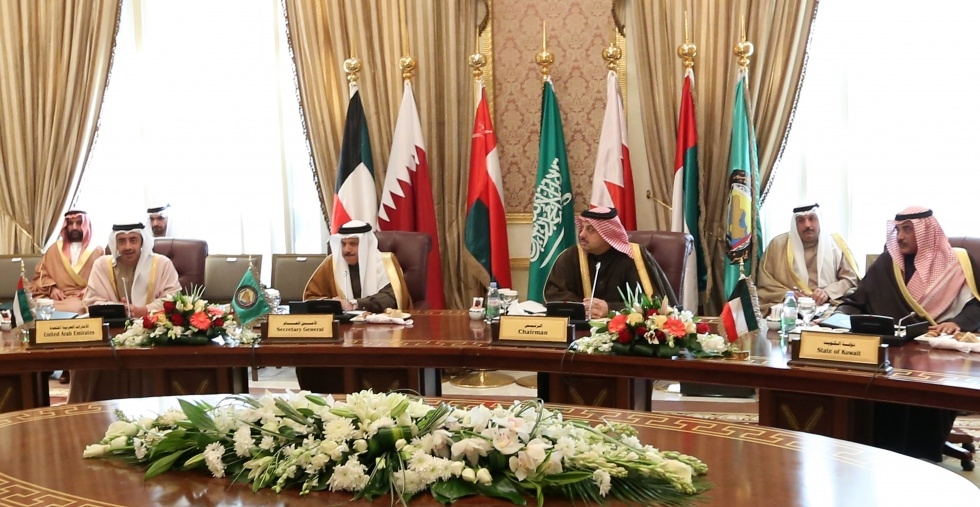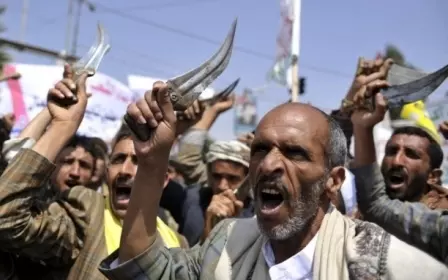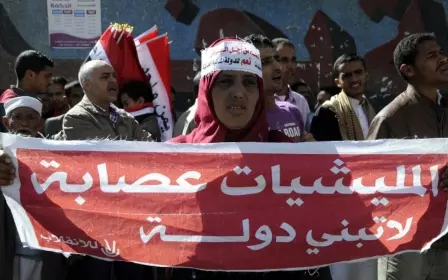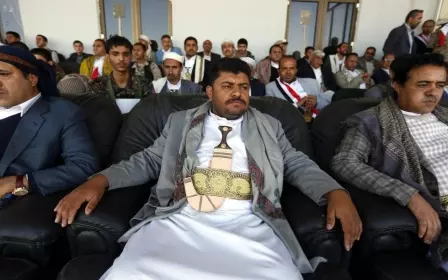GCC threatens intervention in Yemen if resolution not reached with Houthis

Gulf Cooperation Council (GCC) countries have threatened to intervene in Yemen if the security situation deteriorates further.
In a joint statement on Monday, the foreign ministers of Saudi Arabia, Kuwait, Qatar, Bahrain, Oman and the UAE warned that if talks between Shiite Houthi rebels, who seized control of capital Sanaa in early February, and ousted politicians and opposition figures fail to yield results they would step in.
“In the case of failure to reach an agreement [...] the GCC member states will take measures which enable them to maintain their vital interests in the security and stability of Yemen,” said the statement.
They also demanded the implementation of a UN resolution to impose sanctions on anyone “hampering the process of peaceful transition of power.”
They renewed their call for the safety of Yemen’s ousted President Abd-Rabbu Mansour Hadi.
The GCC previously condemned the Houthi takeover as a “terrorist act” and a “coup against legitimacy.”
The Sunni-dominated kingdoms in the Arabian Peninsula have long feared the ramification of a strong Shiite-controlled enclave adjacent to their borders, compounded by fears about growing Iranian influence in the region.
Some Yemeni officials have accused Saudi Arabia of sending arms and money to tribesmen in Yemen’s Marib province, a region noted as a hub for al-Qaeda in the Arabian Peninsula (AQAP), which has repeatedly clashed with the Houthis.
Saudi Arabia has yet to comment on the accusations.
Houthi militiamen clashed with tribesmen near the central city of Baida on Sunday, with 12 Houthis reportedly killed, according to tribal sources.
Also on Sunday, the United Nations Security Council (UNSC) called on the Houthis to cede power and release Hadi, as well as agreeing to negotiate in “good faith.”
Government buildings seized in South
Supporters of Hadi seized control of government buildings in the southern city of Aden on Monday, raising fears over ever-louder calls for secession in the region.
Members of the Popular Resistance Committees took control of several buildings in Aden from Houthi rebels, who have taken power in the capital Sanaa and suspended Yemen’s parliament.
Among the buildings captured were the main power station, the intelligence headquarters and the free zone authority offices. Four people were reportedly killed in fighting.
The Aden TV station was allegedly among the seized buildings, though this was denied by Aden’s governor Abdel-Aziz bin Habtoor, who confirmed clashes had taken place.
Hadi, who was born in the southern Yemen region of Abyan, was popular among southerners. His resignation in late January in the wake of increasing consolidation of power by the Houthis, provoked outrage in the south and prompted calls by exiled secessionist Southern Movement leaders for South Yemen to break away.
On Sunday politicians and governors of three southern provinces, Aden, Mahra and Lahij, joined together to condemn the Houthi takeover as a “coup” and called for Hadi’s return and the implementation of a federalist structure in Yemen.
The People’s Democratic Republic of South Yemen was the only Marxist-Leninist state in the Arab world, but reunified with the north in 1990.
A bloody civil war in 1994, an attempt to reassert the south’s sovereignty, failed to quell repeated calls for South Yemen to again break away from the rest of the country, which has been marred by poverty, unemployment and militant violence.
Embassies closed
Turkey was the latest country to close its embassy in Yemen on Monday, citing a “deterioration in security” in the country.
"We hope that the authority of the state is re-established in Yemen so that we can resume our diplomatic services in this friendly state,” the foreign ministry said in a statement.
Saudi Arabia, the United States, France, Germany, Italy, Britain, the Netherlands, UAE, Spain and Japan have all closed their embassies in Sanaa.
Yemen has been in a state of unrest since the beginning of uprisings in 2011 which eventually led to the ousting of former President Ali Abdullah Saleh in 2012.
The country has also been a primary focus of a US anti-terror campaign against AQAP, which has frequently been labelled the most dangerous wing of the al-Qaeda franchise by US officials.
New MEE newsletter: Jerusalem Dispatch
Sign up to get the latest insights and analysis on Israel-Palestine, alongside Turkey Unpacked and other MEE newsletters
Middle East Eye delivers independent and unrivalled coverage and analysis of the Middle East, North Africa and beyond. To learn more about republishing this content and the associated fees, please fill out this form. More about MEE can be found here.




